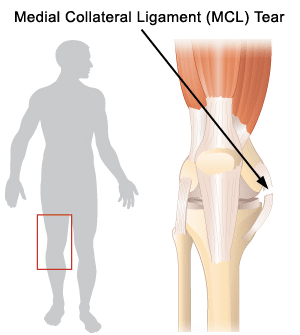Pick a Body Area
Knee Articles- Quadriceps Muscle Strains
- Meniscal Tears
- Anterior Cruciate Ligament (ACL) Tear
- Posterior Cruciate Ligament (PCL) Tear
- Medial Collateral Ligament (MCL) Tear
- Lateral Collateral Ligament (LCL) Tears
- Anterior Knee Pain
- Patello-femoral Pain (Commonly Called Chondromalacia Patella)
- Patellar Tendinitis (Jumper's Knee)
- Knee Osteoarthritis
- Iliotibial Band Friction Syndrome (ITBS)
- Knee Replacement
Medial Collateral Ligament (MCL) Tear

MCL tears are common injuries. A forceful stress on the outside of the knee can cause a stretching and injury of the MCL. Signs and symptoms include knee pain at the inner aspect and swelling. Medial meniscal tears and ACL injury may occur with severe trauma (commonly occurs during football and soccer). Initially, rest, ice, elevation and compression is necessary followed by bracing and rehabilitation. Severe tears may require surgery.
Possible Treatments
- Core Strengthening Video
- Cryotherapy or Cold Therapy Video
- Electrotherapeutic Modalities
- Gait or Walking Training Video
- Isometric Exercise Video
- Knee Active Range of Motion Video
- Knee Joint Mobilization Video
- Knee Passive Range of Motion Video
- Knee Resistive Range of Motion Video
- Neuromuscular Electrical Stimulation Video
- Proprioceptive Neuromuscular Facilitation (PNF) Video
- Proprioception Exercises Video
- Physical Agents
- Soft Tissue Mobilization Video
- Stretching/Flexibility Exercise Video
- Core Strengthening
Possible Treatment Goals
- Improve Balance
- Improve ability to bear weight/stand on the leg(s)
- Decrease Risk of Reoccurrence
- Improve Fitness
- Improve Function
- Improve Muscle Strength and Power
- Increase Oxygen to Tissues
- Improve Proprioception
- Decrease Postoperative Complications
- Improve Range of Motion
- Self-care of Symptoms
- Improve Tolerance for Prolonged Activities
- Improve Wound Healing
Additional Resources
Disclaimer
The information in this medical library is intended for informational and educational purposes only and in no way should be taken to be the provision or practice of physical therapy, medical, or professional healthcare advice or services. The information should not be considered complete or exhaustive and should not be used for diagnostic or treatment purposes without first consulting with your physical therapist, occupational therapist, physician or other healthcare provider. The owners of this website accept no responsibility for the misuse of information contained within this website.
